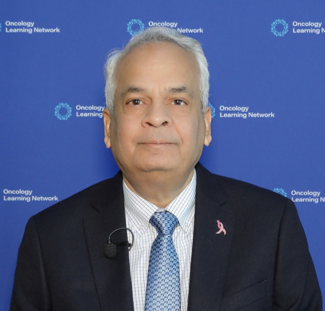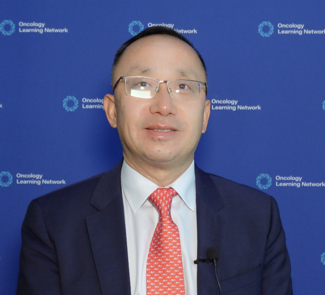Omitting Carboplatin from Neoadjuvant Regimen for Patients With HER2-Positive Early Breast Cancer
Rachel Abelman, MD, and Seth Wander, MD, PhD, Massachusetts General Brigham Cancer Institute, discuss the phase 3 neoCARHP study. This multicenter, open-label non-inferiority trial evaluated the efficacy and safety of a de-escalated neoadjuvant taxane plus trastuzumab and pertuzumab with or without carboplatin among patients with HER2-positive early breast cancer.
Dr Abelman commented that these date are “reassuring, that patients experience similar rates of pCR and by subgroup regardless of addition of the carboplatin or withdrawal of the carboplatin.” She added that these results “will impact our clinical decision making for a long time to come.”
Transcript:
Rachel Abelman, MD: I am Rachel Abelman. I'm a medical oncologist at the Mass General Cancer Center.
Seth Wander, MD, PhD: And I'm Seth Waer. I'm also a breast medical oncologist at the Mass General Cancer Center.
The neoCARHP study was a multicenter, open-label, randomized, prospective non-inferiority phase 3 trial. This was a large study. It accrued more than 770 patients across 15 different sites, and these patients had stage 2 to 3 hormone receptor, either -positive or -negative, HER2-positive breast cancer. They were randomized to receive either the current standard of care, which was Taxotere [docetaxel], carboplatin, Herceptin [trastuzumab], and Perjeta [pertuzumab] (TCHP), or de-escalation to docetaxel alone with a dual antibody blockade (THP). These patients were then followed with a primary endpoint of pathologic complete response [pCR] rate.
What we saw here was reassuringly, that the pathologic complete response rates between the 2 groups, either TCHP or THP were very similar. They were just over 64% in the patients who received THP and just under 66% in the patients who received TCHP with an odds ratio of 0.93 and confidence interval of 0.69 to 1.25. As might be expected, the patients who received deescalated therapy with THP had fewer grade 3 to 4 adverse events compared to those who had the 4-drug combination. And so the authors here concluded that THP provided non-inferior pathologic complete response rates and potentially improved tolerability compared to TCHP.
Dr Abelman: I think this is a really interesting provocative study. I think that certainly influences the way I discuss treatment decisions with patients and allows for the opportunity of really patient-centered decision-making. I think these data are really reassuring in talking to patients who would prefer to avoid carboplatin, which we know certainly adds toxicity to regimens.
I think that while we await additional data to look at longer term outcomes, I think this is certainly reassuring that patients experience similar rates of pCR and by subgroup regardless of addition of the carboplatin or withdrawal of the carboplatin. And certainly I think that this will impact our clinical decision making for a long time to come.
Dr Wander: I would also agree that this is an area where people have been thinking about doing this for quite a long time, and we're always looking for opportunities to deescalate and personalize therapies for patients. There are still some important unanswered questions, I think in this patient population.
The authors presented some additional data at ASCO looking at the impact of hormone receptor status and nodal status here. One might imagine that a strategy like this could be perhaps more appealing in patients with slightly lower risk disease. For example, patients with lymph node-negative disease or patients who might have a higher baseline probability of achieving a pathologic complete response. For example, those patients who might have lower ER status and higher HER2 status. I think at this point, it's an important new data point in the spectrum of early-stage clinical trials for HER2-positive disease. There are going to be a lot of interesting ongoing discussions at tumor boards over the next number of months, thinking about individual cases, and that's what it is.
It's going to be personalized decision-making for each individual patient based upon their medical comorbidities, their age, their tumor pathology, the extent of disease, and it'll be interesting to see how the field integrates this into practice moving forward.
Source:
Gao H-F, Qu Z, Dong J, et al. De-escalated neoadjuvant taxane plus trastuzumab and pertuzumab with or without carboplatin in HER2-positive early breast cancer (neoCARHP): A multicentre, open-label randomised, phase 3 trial. J Clin Oncol. Published online June 4, 2025. doi:10.1200/JCO.2025.43.17_suppl.LBA500
















